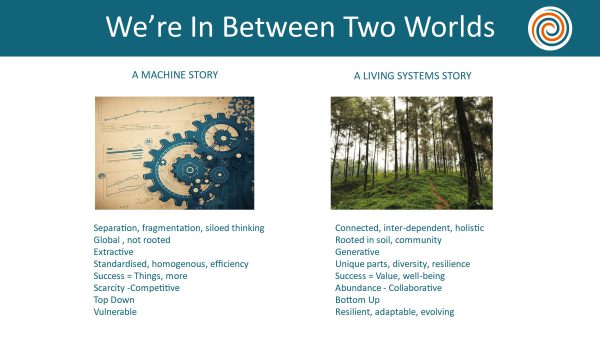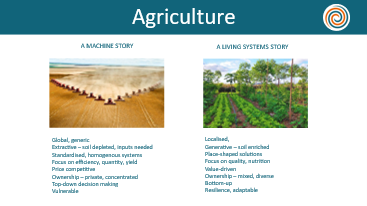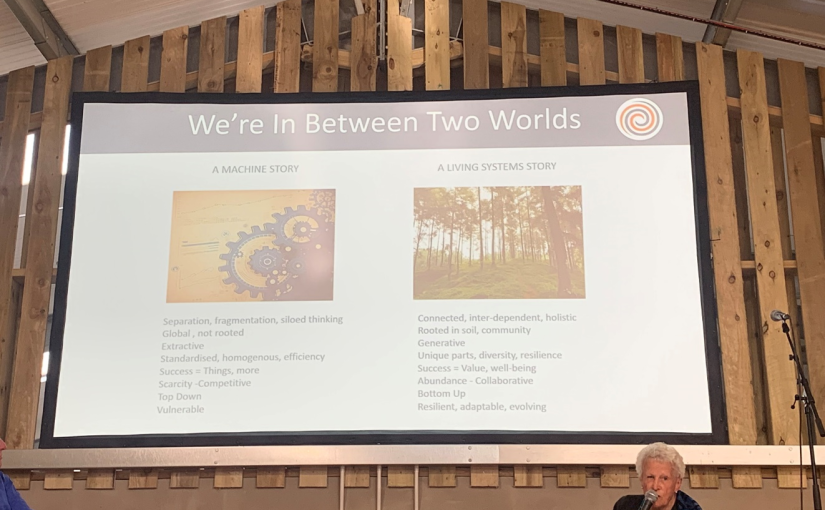I recently had the privilege of attending the Regen Gathering organised by Hypha consulting in Jersey which left me feeling invigorated and hopeful for the future of our beautiful island community.
The event focused on regenerative food systems, but this year also provided a bridge to the visitor economy, bringing together a raft of world-renowned expert speakers and hundreds of community members over two days at Le Tacheron Farm’s excellent new space in Trinity, Jersey.
These are my key takeaways.
Olivia Chaplin, Sector Lead – Retail & Visitor Economy, Department for the Economy
Hope and optimism
There is reason for hope and optimism. This is a theme that came up in several conversations – the knowledge that so many great minds can be brought together in the same space from a small island is extremely reassuring and gives confidence that we have what it takes to find ways to solve some of the biggest issues we must face now and over the coming decades.
We are in between two worlds
In the excellent words of Anna Pollock, we are in between two worlds – the former one of the Machine Story, a system based on extractive economic theory and which has dominated our thinking for the past century, and the emerging Living Systems Story which is gaining traction and understanding among the more progressive thinkers and those who are already working directly with the natural environment and its systems, including those at the forefront of regenerative agriculture.

This situation presents us with a paradox of economic, societal and moral importance, and our ability to hold several truths in our minds simultaneously and to work within an existing system while imagining and designing a path to a future one is stretching our cognitive abilities to their limits. Understanding that the discomfort and uncertainty we feel is rooted in the generational and systemic change our society is undergoing gives me comfort, knowing that humanity has overcome similar challenges in the past and is probably better equipped than ever to deal with them. We may need to endure this for some time to come, but our ability to come together to tackle this collectively is extremely reassuring and another reason for optimism.
The power of collective thinking
Several references were made to collaboration and the power of collective thinking. The coming together of a community to share ideas and find solutions represents an opportunity for bigger systems thinking, as opposed to the more divisionist and siloed approach which remains prevalent in the dominant system. Our tendency to look at issues in isolation when these may in fact be symptoms of a much great problem is the result of how we are taught to think, but we have the intelligence to change that.
Our community of business people, thinkers and creatives have it within their power to lead change, without the need for a top-down, government led approach, which would allow the latter to function as a supportive frame and enabler of change rather than the source of all the answers. A regenerative approach presents an opportunity for “radical consultation” where community leads the process rather than merely being consulted with.
“We don’t need more data we need more conviction”: more reason for encouragement from one of the speakers, whose advice I think was to just have the courage to get on with it.
There is more in common than you might think between agriculture and hospitality
Listening to a number of discussions, it also became apparent to me there is more in common than you might think between agriculture and hospitality.
- I heard growers talking about the challenges they face, including cost base increases and how that impacts investment confidence, the high cost of entry, the need to find alternative forms of capital where traditional lending does not work, the difficulty of reaching the market even though demand from consumers is strong, the need to meet consumer expectations of convenience, not just price etc…
- There was also discussion about the need to allow for failure in business in order for innovation to happen. If we adopt similar patterns to nature where individuals may be allowed to fail in order for the species to thrive or some crop failure is factored into the business plan in order for a growing farming business to experiment and adapt to survive then we might stand a better chance of creating the conditions for entrepreneurs to thrive.
- The need for connection to food and nature among consumers will continue to drive demand in both areas, which creates an opportunity for Jersey in both the food it produces and the potential for agri-tourism which can provide a unique place-based learning experience for the consumer and at the same time reinforces the need for honest discussions about provenance and sustainability.
Rooted in place
Agriculture and hospitality are both firmly rooted in place, a concept that I increasingly hear people talking about – What is Jersey? What is our brand? What is our USP? What is our identity? Why are we no good at place-making? Whose role is that? Agriculture and hospitality offer an answer to this through their people, communities and stories, something we have the opportunity to enhance and amplify in order to educate and provide visitors with a unique experience of what makes up our community.
We can learn from each other, and the fact that farmers and growers are already embracing regenerative principles in Jersey provides a model that we should explore further in other parts of the economy.

Community is the soil of hospitality
For me the absolutely resounding quote of the day was this: “Community is the soil of hospitality.”
This gets to the crux of what a regenerative model means for hospitality. In the world of agriculture, the health of the soil is essential for creating the conditions for plants to thrive, so this needs to be regenerated for life and food production be sustainable. For hospitality, the host community is the substrate necessary for the sector to thrive.

Further reassurance came from the message that “We can expect better outcomes if we change how we measure success”. Looking purely at economic output may not serve us well if it is at the expense of measures of natural and cultural health, so we need to ask ourselves the question of what we should be measuring. Paying closer attention to the health of the soil and the community rather than sector output might shift our perspective. It is also quite clear that the health of the agriculture and hospitality sectors must also be an indicator of the health of the wider economy and society in general.
As you can see, it was a thought-provoking event that brought together a clearly galvanising community that we can all be proud to be part of, and I look forward to collaborating and exploring these ideas further with people and businesses across our community and local economy as part of our collective transformation towards a thriving future.
Visitor Economy Vision: To be a globally recognised, sustainable and enriching destination that Islanders are proud to share
With thanks to Anna Pollock from Conscious Travel (anna@conscious.travel) for her support
 blog.gov.je
blog.gov.je